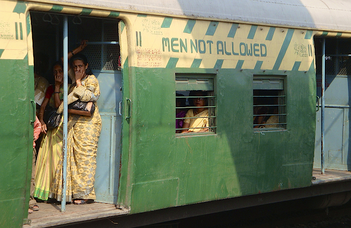The Precarious Condition of Women Commuters by Sanchali Sarkar: Lecture

31. January 2020. 11:00
ELTE BTK Indológia Tanszék, Múzeum krt. 6-8/A (Ifjúsági épület) fszt. 4.
2020. January 31. 11:00 -
ELTE BTK Indológia Tanszék, Múzeum krt. 6-8/A (Ifjúsági épület) fszt. 4.
Az ELTE BTK Indológia Tanszéke
tisztelettel meghívja
Sanchali Sarkar
(Research Consultant, Centre for Health and Social Justice, New Delhi)
The Precarious Condition of Women Commuters
A Study of the Matribhumi Train in West Bengal, India
című angol nyelvű előadására.
Az előadás időpontja: 2020. január 31., péntek 11:00
Az előadás helye: ELTE BTK Indológia Tanszék
Múzeum krt. 6-8/A (Ifjúsági épület) fszt. 4.
Minden érdeklődőt szeretettel várunk!
A tartalomból
This paper studies the precarious condition of women commuters in Matribhumi (trans.
Motherland), an entire train for women introduced in 2009 in the state of West Bengal, India.
The paper specifically concentrates on the intersections of gender with two of the various
other identity markers- caste and class, and concerns how these shape the experiences of
women commuters during their access to mobility. It is also attentive to the issue of violence
against women commuters who are respectfully, and/or ambivalently referred to as ‘mothers’.
In emerging economies like India, public transportation is an essential component that helps
women access both the formal and informal economy; but it is also a common site for
violence which affects general mobility. This paper addresses the lacuna when it comes to
understanding gender, class, and caste in a context of patriarchy with a particular focus on
women-only public transport in Bengal.
The word ‘matri’ (trans. mother) in “matribhumi” edges on subjugating non-normative
gender relations and endorses a “specifically heterosexualized familial embodiment” (Enloe,
1989). ‘Matri’ also implicates “a woman’s need to be modern but containing themselves to
the traditional […] modern yet modest which make them vulnerable to political agendas”
(Sinha, 2016). The patriarchal image production of the sari-clad Hindu married woman on
Matribhumi train walls highlights a conventional Hindu prototype which poses risk for
women who are shifting from stereotypes and emerging as important economic actors in
public.
Therefore, this paper focuses on a more “transversal politics” which acknowledges the
difference between women by putting each woman “in a situation of exchange with [other]
women who have different membership and identity” (Yuval-Davis, 2002), drawing in
multiplicity of the political, cultural, and social intersections to study how these factors
govern the mobility of the women-commuters in public transport.

